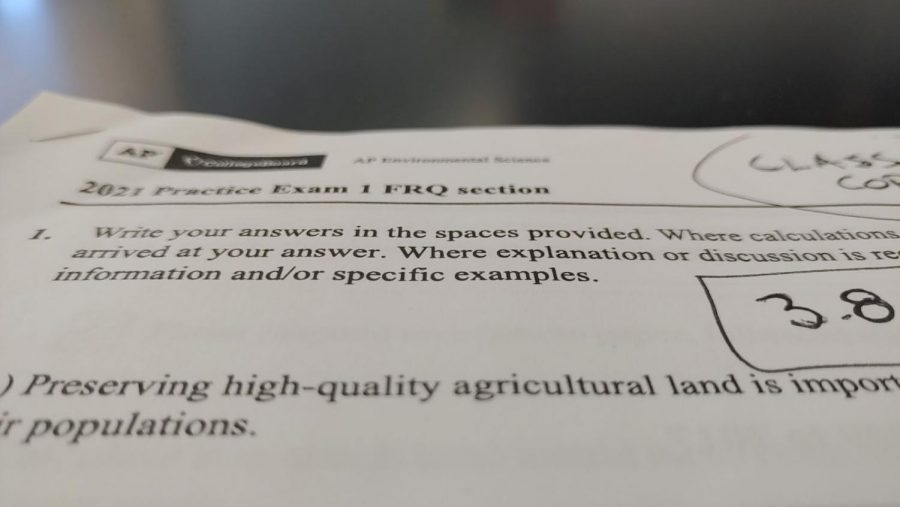AP Exams
Advanced Placement exams begin on May 3rd
Picture of an answer key to a practice exam for the AP environmental science exam taken on April 27th. The practice exam was in the style of a real exam including two sections, the multiple choice and the free response question sections.
Advanced Placement classes offer college credits depending on what colleges you choose to go to. The exams can last a few hours and the dates for the exams and the location they will be taken varies based on the class.
This first exam is on May 3rd, being in-person instead of remote like last year.
“Last year was a little weird because for the exam usually they are broken up into multiple choice questions and then your responses which differ per class,” sophomore Maddie Potter said. “But for AP Human Geography it was free response questions. Basically instead of doing multiple choice questions and things for the exams we just did three free response questions.”
AP classes count towards college credit for select subjects. The scores that colleges will accept for credit varies, some colleges look for a higher score to prove that you understood a subject. These exams cover everything that has been learned throughout the year and includes a few FRQ (Free Response Questions) to be answered after the multiple choice section.
“It’s kinda stressful because being in an online environment and having open note tests have been hard to be able to prepare for the exam, memorization hasn’t been a part of this year a lot,” junior Elise Clark said. “For reading and multiple choice questions it’s important to pick out keywords to use when it comes to studying, just being time efficient.”
It isn’t too late to begin preparing for the exams, or to register for an AP class if you are interested in taking them next year. AP classes are college level classes, and are a good way to prepare for the college level of learning.
“If you can’t articulate something thoughtful about them (the questions) in a couple minutes you’re out of luck,” AP language teacher Brian Stotts said. “Someday in the real world, college or in work, you’re going to need those skills, and if you don’t have them it’s going to be a rude awakening.”
One of the best ways to prepare for the AP exams is to study. Looking over notes that have been taken throughout the year and to study for the test that is going to be taken first. Stressing makes it difficult to focus and study, remaining calm as you prepare for the AP exams helps.
“I’m taking AP classes because I want to challenge myself,” Clark said. “To create opportunity to get to know what a college class is like, especially in AP. It’s also a great environment with students who want to learn academically and be successful in that way.”
Not all colleges or universities accept AP credit. Some colleges may look for a 3 or a 4 or even a 5 as a score to accept college credit. Even though some colleges don’t accept it at all, it looks good on an application for a college.
“If you decide not to take the exam, that’s okay too, because the level of education in an AP class is college level,” AP US history teacher Dawn Benish said. “The skills that you are gaining and learning just by virtue of taking the class, whether you take the exam or not, help prepare you for that college experience. Statistics show that students who take those AP classes stay in AP classes longer, get degrees, and get higher grades in the classes they are taking.”








